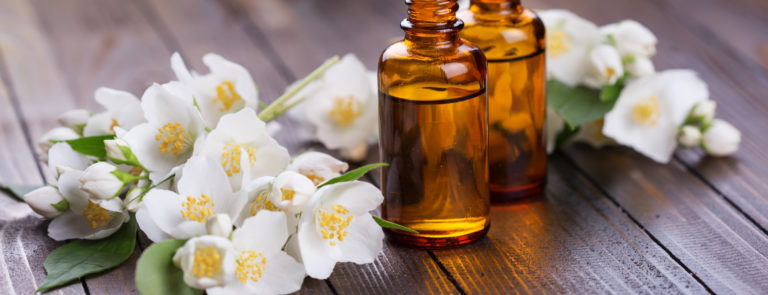10% off £35
Jasmine essential oil: uses and benefits

Beautiful in name and beautiful in scent, jasmine essential oil comes from the tiny white flowers that can be found on jasmine, or Jasminum Officinale plants, which originate from Iran.1
Renowned for its sweet and deeply rich aroma, jasmine is a popular ingredient for perfumes, particularly classic French fragrances, such as Chanel’s iconic No. 5, Miss Dior and Opium.2,3
Originating from China and India, jasmine essential oil is linked with Hinduism and has long been used in China to clear ‘sick’ rooms of pollutants.
How is jasmine made?
The process of extracting jasmine oil from jasmine plants is different to the way most other essential oils are produced. This is because steam distillation, which is one of the most common methods, may damage the delicate jasmine flowers.4
Solvent extraction is widely used for jasmine oil production.
The petals are immersed in hexane or ethanol solvent and rotated, releasing the fragrance molecules into the mixture. The longer the flowers remain in the solvent, the more fragrance oil can be removed.
The liquid is then distilled to produce a wax-type product called ‘concrete.’
The concrete can be used to create solid perfumes or mixed with grain alcohol to remove the wax and colour. Distilling the alcohol leaves behind pure jasmine oil.5
How long have people been using jasmine essential oil for?
Jasmine oil has a long and colourful history. Its calming qualities have been known for a long time; way back to when the Ancient Egyptians used it for headaches and to help improve sleep quality.6
The jasmine flower features in stories of ancient China, Persia and Egypt. It was revered by royalty in China and traded along the Silk Road. And it formed an important part of perfumery back in the time of Cleopatra and Louis XVI.7
How can it be used?
There’s so much you can do with jasmine oil. You can:
-
Inhale it
In aromatherapy, inhaling jasmine oil molecules is thought to send messages to the limbic system, a region of the brain involved in controlling emotions and influencing the nervous system.8
There have been some clinical trials investigating the benefits of jasmine aromatherapy in general which have bought about mixed results, with some studies showing improved mood, anxiety and sleep.9
-
Apply it
In the same instance, applying jasmine to your skin is thought to work in the same way as inhalation, as a great relaxant.
To do this you should dilute it with a carrier oil and then a few drops to your pulse points.
-
Spray it
In some cultures, jasmine is used as a natural soother, much like lavender. Its sweet scent is thought to help manage feelings of stress and anxiety, helping the body to unwind.
To make a room spray, add 15 to 25 drops (for a stronger scent) of jasmine oil to distilled or purified water.
For a milder scent, use 20 drops of essential oil for every 4 oz of water.10
-
Diffuse it
Put some in a diffuser and breathe in the aromatic scent and the above benefits.
Try this by combining 1 drop of jasmine oil with 1 drop of rose oil, 1 drop of ylang ylang and 4 drops of nerol.10
-
Massage it
Jasmine is an aphrodisiac, meaning it can heighten sexual desire. That’s why it’s a common ingredient in massage oils, as well as, of course, perfume.
Dilute 5 drops of essential oil with 10ml of Miaroma base oil and apply. Note – it blends well with bergamot, chamomile, clary sage, geranium, lavender, lemon, neroli, peppermint, rose and sandalwood.11,12
-
Bathe in it
Add 4 to 6 drops of oil into warm running water. Then relax in the bath for at least 10 minutes to allow the aroma to work. You may even want to add some drops of lavender for a more luxurious soak.13
Jasmine oil benefits
Jasmine oil has been known to have antiseptic, antispasmodic and rejuvenating properties. As a result, there are lots of benefits to using it, including these four:14
-
Lifts mood
It is widely considered that using jasmine in aromatherapy or on the skin can lift your mood. The floral energy created by the sweet and rich scent is said to boost happiness and increase confidence, as well as reduce feelings of stress, anxiety and anger.15
-
Could improve sleep quality
Thanks to its relaxing properties, as well as antispasmodic and mood settling qualities, jasmine may help improve relaxation and overall restfulness.16
-
Increase libido
Jasmine’s romantic scent has long been believed to have an aphrodisiac effect on the libido, possibly because inhaling it or using it in aromatherapy massage supports mood and energy levels.17
-
May improve your immune system
Jasmine oil is believed to have antiviral, antibiotic and antifungal properties that make it effective for fighting illness.
In Thailand, jasmine has been used for hundreds years as folk medicine treatment in order to treat various internal infection, plus respiratory problems and skin disorders.
-
May help you relax
Jasmine oil acts as a natural soother which exhibits a calming effect that may help you sleep better.
A European Journal of Applied Physiology study found that jasmine tea odour had sedative effects on both autonomic nerve activity and mood states.
They also found that mixing jasmine with lavender helped reduce heart rate and bring feelings of relaxation and calm, which can only be a helpful thing when trying to get to sleep.18
-
Supports menopause
Using jasmine oil either as an aromatherapy treatment or applying it directly to the skin may help manage the emotional symptoms of menopause.
One particular study stated that when menopausal women applied jasmine oil to their skin over an eight-week period, they showed improvements in energy levels and mood compared to women who weren’t using jasmine oil.19
-
Manage feelings of PMS
Studies show that jasmine oil one of a few of essential oils that act as phytoestrogens, which are plant constituents with a phenolic structure similar to oestrogen.
One particular study found that jasmine oil has the ability to help manage PMS, menopause and other hormone-related issues after testing women for 11 common symptoms related to hormone fluctuations.
Researchers found that aromatherapy and massage with phytoestrogen oils helped decrease symptoms without causing any negative side effects.20
-
Help with post-pregnancy symptoms
Jasmine has been found to help ease postnatal feelings, including anxiety, depression and low energy, which have all been found due to scientific research.21
Studies found that when compared to test results prior to inhaling jasmine oil, the results after using jasmine oil showed a significant improvement in cognitive-emotional responses.
-
May improve your concentration
Jasmine oil is scientifically known for its stimulating and arousing properties.
Its active ingredients have been shown to improve heart rate, body temperature and brain activity that are needed for active learning and problem solving.22
-
May help promote healthy skin
You can mix jasmine oil into your face cream, shower gel or body lotion and other beauty products, which may help blemishes, improve dryness, balance oily skin, prevent wrinkles and fine lines, and calm shaving sensitivity. If you're curious about how else to tweak your diet for clearer skin, see the top 10 best vitamins for healthy skin.
Jasmine Essential Oil | Benefits & Uses | Holland & Barrett
How to use it safely
Always do a patch test to it make sure it doesn’t irritate your skin and always dilute it first with a carrier oil before putting it on your skin. Always follow the manufacturer’s guidelines on how to use it.23
Facts about jasmine oil
- There are about 200 different species of jasmine.
- Jasmine plants are ripe for picking between July and October. This usually happens at night to help preserve the intoxicating aroma.24
- In Hinduism, jasmine is considered as having a place of honour as the ‘perfume of love’.25 This is down to its fame as an aphrodisiac in many cultures.
- For the same reasons, jasmine essential oil is nicknamed Queen of the Night because of its strong scent and libido-boosting qualities.
- In some countries around the world. The unique aroma of jasmine is used to flavour drinks, baked goods, puddings and frozen desserts.
- In China, people used to use jasmine oil to cleanse hospitals, thanks to its recognition as a cure for poisonous bites and stings.26
- Jasmine bushes reach a height of 3 to 4.5 meters (10 to 15 feet). Jasmine vines can reach up to 9 meters (30 feet) in height by attaching to the nearby structures.
- Jasmine can live 15 to 20 years in the wild.
Last updated: 11 June 2021
- https://www.therecoveryvillage.com/mental-health/eating-disorders/related/importance-of-body-positivity/
- https://www.bbc.co.uk/bitesize/articles/z2w7dp3
- https://www.mentalhealth.org.uk/sites/default/files/DqVNbWRVvpAPQzw.pdf
- https://www.mentalhealth.org.uk/publications/body-image-report/exec-summary
- https://www.skillsyouneed.com/ps/positive-body-image.html
- https://www.skillsyouneed.com/ps/positive-body-image.html














